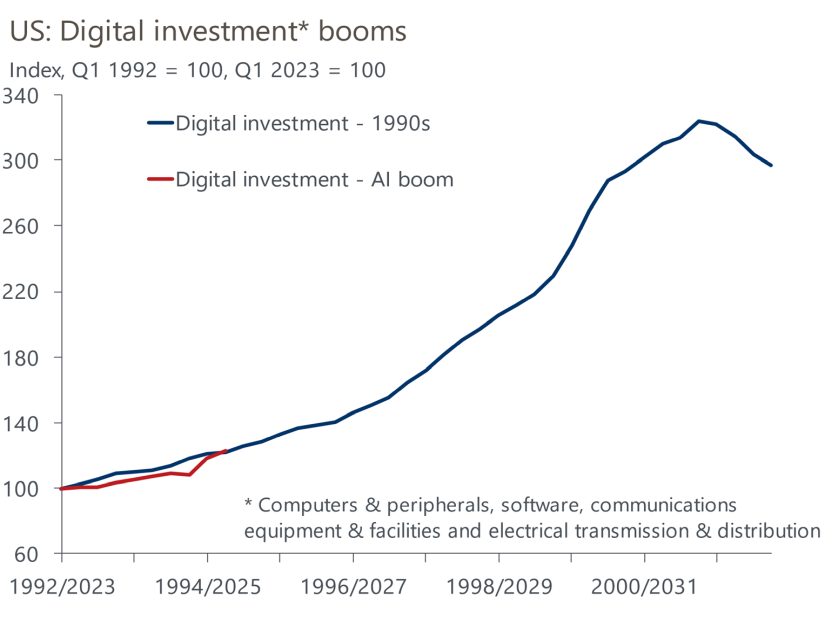The end of AI is not nigh
A strong rise in price does not by default mean irrational investors have created an unsustainable bubble, or that a sharp price reversal is the sole logical outcome, inevitably, and just around the next bend in the relentless uptrend.
Probably the most obvious example of that statement is Australian property prices. Yes, they are 'expensive'. Yes, the multiples and ratios have expanded significantly from comparable times in the past. But isn't it remarkable how all the doom and gloom forecasters have gone silent on their previous conviction forecasts?
Property prices haven't fallen into the abyss. If anything, they've kept on rising, with the occasional pause/brief pull back along the way.
My own conclusion has always been that too many of these forecasts are made on too flimsy justifications; simply looking at asset prices without the broader context surrounding them is, by definition, a flawed and unscientific way of analysing and making forecasts.
Quod erat demonstrandum.
Admittedly, things are not always straightforward, and seeing the forest through the trees is not easy when you're in the midst of the action. Plus, when it comes to the share market, narratives, FOMO and bubbles are always firmly embedded and part of what creates broad-based enthusiasm for market participation.
In simple terms, bubbles, in all kinds of lengths and varieties, are part and parcel of what makes investing both treacherous and exciting.
The years past have offered plenty of examples, from electric vehicles and lithium, to 3D printing, cannabis, Covid beneficiaries, and GLP-1s. In all cases, lots of money was made during the good times, but it didn't last, and those who stayed the course or returned too soon suffered the consequences.
The situation in late September 2025 is that equities have - without debate - experienced a truly fantastic run since bottoming on the back of a global reset in bond yields in late 2022; particularly in the US, where "exceptionalism" has become the new buzzword for investors and financial commentators.
The S&P 500 is up 86% since its closing low on 12 October 2022, while the Nasdaq Composite has risen 121% since 28th of December that year. Achieved over less than three years, those returns are well above historical averages. Equally important: after such a run, multiples and ratios are well above historical averages too; in some cases, they are near or at an all-time high.
Hence, it's understandable for your average level-headed market participant to start asking questions, like: Is this experience too good to remain true? US equities haven't experienced one negative month since the tariff-related sell-off in April. The uptrend has remained so strong that even a seasonally treacherous September has passed without a dent in the trend.
US markets have been flashing 'overbought' signals for a number of weeks, but to no avail. At least up until now. Markets do not necessarily follow a set script (see September), but maybe they'll find something to unwind some of this year's bubbled-up exuberance when we least expect it throughout the weeks ahead.
But contrary to what general commentary might look like (I suspect), any temporary unwinding of too much hot money chasing the same narratives tells us nothing about the elasticity and durability of what has - at its core - fuelled today's bull market; artificial intelligence, or AI.
For those aiming to draw parallels with similar-looking times prior to significant bear markets a la 2000 and 2008, there are multiple similarities that can be highlighted, including strong upward momentum and elevated valuations, but that, still, might not be the full picture.
Indeed, a recent update by Oxford Economics (hardly the kind of analysis source that can be accused as biased towards pulling more clients’ money into the market to keep the trend going for longer) suggests rather than approaching its final destination, today's investment boom in AI and its underlying infrastructure might only have just started (see the comparative chart with the 1990s below).

Source: Oxford Economics
Leaving negative biases aside in favour of a glass half-full approach, there are at least as many signals and indicators available to support conclusions and projections from Oxford Economics and others in favour of ongoing AI 'exceptionalism'; and they are worth highlighting lest investors are wrongly presented with the conclusion all the good news has occurred already and the only possible outcome is now for a return to the mean (or worse).
Recent media reports on a survey conducted by MIT, concluding 95% of all enterprises investing in AI had failed to achieve tangible results, is an excellent example of how much the bias has turned in favour of AI disbelief and warnings about the next bear market post share market exuberance.
While that was indeed one of the conclusions drawn, the same survey also suggested the 95% could learn from the successful 5% who'd chosen not to develop the entire AI process in-house, but instead hired experience and insights from outside. This also immediately counters one of the emerging narratives that saw share prices in software companies sold off on Wall Street and locally.
The idea that today's equivalents of Hewlett and Packard, hibernating in their parents’ garage, rewriting software applications with support of AI, might soon make established software services providers redundant, now that sounds a lot like science fiction-like wishful thinking to me.
It also completely underestimates what else is needed to become a multi-million dollar success story with sticky customers that have become dependent on their products and services. I don't think today's shareholders in Data#3 (DTL), TechnologyOne (TNE), WiseTech Global (WTC) or Xero (XRO) need to worry; not for this particular reason.
The direct AI-impact thesis does seem valid in specific cases, like for Adobe, whose product suite includes pricey software for designing images, which can now be done through generic AI applications.
If anything, it appears a lot more likely today's software companies with a sticky customer base attached to their platform will be among the second-stage winners of this further developing megatrend. Morgan Stanley has just elevated Microsoft to Top Pick status.
Keep an eye out for October 9 when TechOne is planning to make its next announcement to clients and the financial market at large. TechOne's Showcase event in Melbourne this year is scheduled to include the "launch of groundbreaking AI-driven functionality" with a follow-up Q&A session for investors.
As most readers are probably all too aware, I am a long-time shareholder in TechOne, but most importantly, such announcements support the view that megatrend AI is only just getting started.
In equal fashion, the recent August results season was the very first in which many ASX-listed companies started to communicate their own intentions and investment in AI.
Those who stepped on a podium include the usual suspects of Car Group (CAR), Hub24 (HUB), Pro Medicus (PME), REA Group (REA) and Temple & Webster (TPW) - all platform operators embedded in software-- but also a widening range of more traditional business models including ALS Ltd (ALQ), CommBank (CBA), Fortescue (FMG), Imdex (IMD), Myer (MYR), Scentre Group (SCG), Sonic Healthcare (SHL), and Telstra (TLS).
BHP's Chief Technical Officer, Johan van Jaarsveld, flagged in an interview with me earlier this year that applying AI at Escondida had achieved an additional US$200 million worth of copper extraction annually. No tangible results?
Probably the best thing that could happen, and that would substantially change the negative bias that has crept into AI market commentary recently, is for more traditional businesses to start exhibiting their success stories. Having said that, one also senses it is simply still too early for that.
TechnologyOne hasn't even made its first big announcement yet, and its bread and butter is software.
As the centre of today's megatrend is located in the US, chances are American companies will generally keep leading the rest of the world. Here, the promise remains for lower costs and higher margins, which could easily justify today's valuations - if such potential does materialise.
Consider, for example, that on today's assumptions, struggling funds and asset managers could reduce their operational costs by up to -40% by reducing admin and red tape, speeding up processes and, yes, by including AI for menial tasks and chores that go with the investment research and decisions.
If the coming years see only half, or even a third, of that potential realised, today's share prices will look like an absolute steal (in hindsight, of course, when looking back in three or four years).
Such examples also highlight why most sceptics' focus is in the wrong places; adopting AI may not necessarily bring about a step-change in revenues for companies, but if it helps lift margins and profits, valuations will rise (all else remaining equal).
By the way, you want more evidence of the "end-is-nigh" bias from the media? Today (Monday), the Australian Financial Review is quoting research by Macquarie to warn about potential damage from the AI-led share market selling off, while in fact Macquarie strategists are POSITIVE about equities and the AI boom.
Macquarie's portfolio is Overweight AI-related exposures like NextDC (NXT), Megaport (MP1) and Goodman Group (GMG).
For good measure: traditional media still function as a broad-based utility source of information, and there is nothing wrong with offering alternative, sobering views and projections, as that, at the end of the day, is what makes the market. We all like to show our readers and viewers that we did warn you once the tide has turned.
I nevertheless sense an eagerness among some to see share markets collapse, which is, frankly, over the top. We all have witnessed market narratives come to a sorry end - think the GFC but also the Nasdaq in 2000 - but at the same time: see Australian property values.
The current AI-led investment boom has effectively kept the US economy out of recession. It is underpinned by ‘gigantonormous’ amounts of spending by mega-profitable tech giants who don't care about short-term returns, as also yet again confirmed by Meta's Mark Zuckerberg recently, but who do have the cash and flow to finance it.
This newly emerged megatrend is equally supported by governments around the world, who do not want to be left behind in what is broadly considered a crucial race to technological leadership. Nobody wants to be left behind, in particular not the US or China.
Those who operate closer to the centre of today's technological breakthrough, with a glass-half-full approach, cannot but admire the step-changes that are occurring in the development of AI.
In the words of Neil Jacobstein, Chair of AI and Robotics at Singularity University: AI is moving so fast it is now a blur.
Will this technology end up re-shaping the world? That process has already started, so yes.
Is this likely to end in tears, eventually? If history is our guide, the answer is probably 'yes'. Simply because it always has.
But if 2025 is the historical equivalent of 1925 or - reflecting back on the suggestion put forward by Oxford Economics - more 1995 than 1999, then today's fearmongers cannot possibly claim many more years into the future that they 'told us so'.
That would not be an accurate or honest assessment of their actions today.
FNArena offers impartial and independent data, views tools and applications for self-researching and self-managing investors. The service can be trialled at (VIEW LINK)
5 topics
5 stocks mentioned

